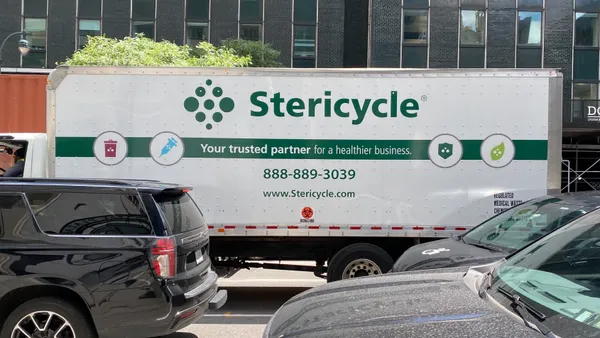Dive Brief:
- Starting on August 2, residents of Falls Church, VA, will have access to a curbside organics collection program for the first time. All material will be collected and processed by a Maryland-based company called The Compost Crew, which will be offering the first six months of service free (aside from a $10 set-up charge) to the first 600 households that sign up through a deal with the city, as reported by the Falls Church News-Press.
- After the six-month window, city residents will pay $6 per month or $66 per year for weekly collection of five-gallon buckets. The company will actually be charging $8.95 for this service, with Falls Church subsidizing the difference, according to Chris McGough, solid waste coordinator for Falls Church. Larger 12-gallon carts are also available for an additional $4 per month.
- This initiative started with a farmers market drop-off in 2016, and has since grown to include a 24-hour drop-off site. So far, about 350 households have signed up for curbside service and the city is aiming for a 20% participation rate. Based on that rate, Falls Church will spend about $20,000 per year on the program and projects that this will save up to $10,000 in landfill or waste-to-energy disposal fees.
Dive Insight:
Curbside organics collection is a rarity in Virginia, and Falls Church believes that this set-up could be a model for many others like it around Washington, D.C. Their contracted waste and recycling hauler, American Disposal, declined an invitation to partner on the idea, and the majority of bidders that responded were smaller niche operations. Under the city's contract with Compost Crew, they will maintain the same pricing structure even if more than 20% of households join. Similar service can cost $30 per month in other areas, unless a municipal partner steps in to help guarantee an economy of scale.
"It created a really nice opportunity for local government to be a catalyst for the private sector that's growing," McGough told Waste Dive.
The Compost Crew already offers similar service in area municipalities, and has been engaged in efforts to grow the industry in Maryland, but is still much smaller than the average waste company. Getting access to Falls Church, where McGough estimates about 25% of the waste is organic, opens up a whole new sector for them. In the future, McGough hopes to expand this service on a pilot basis to multi-unit residential complexes and commercial buildings. He would likely use a similar system of offering free or discounted service to start, paid for with the savings from disposal fees.
The rest of the program's budget was diverted from special recycling drop-off programs that had started to see a decline in interest. According to the latest state data, Falls Church had a diversion rate of 62% in 2016, dipping from previous years. Pairing this trend with an ongoing rise in disposal costs, increased competition at disposal sites from out-of-state waste, and a demand from residents, the program seemed like an obvious choice to McGough.
"It's been really enjoyable to launch this program, because the residents have been just plain excited," he said. "They finally have access to something that's convenient, and in their minds, a much lower cost."
For cities that want to start diverting more organic material from disposal, but are wary of the potential collection costs, this type of local partnership could serve as a model. Not every city has the scale or the budget to offer traditional cart-based collection like in New York, Seattle and elsewhere. It's also more common to find small local composting operations than fully equipped fleets and large-scale processing options in many parts of the country. This approach won't be a solution for everyone, particularly large urban areas that require more processing capacity, but it could help bring other small municipalities into the fold.










